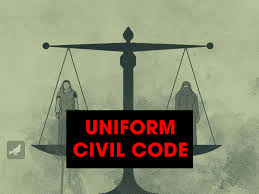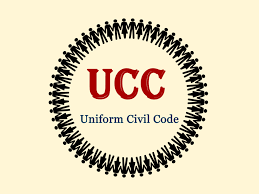


LEGAL DEVELOPMENTS | July 3, 2025
Interplay between Personal Laws and the Uniform Civil Code debate in India
This article is Written by Sumit Kumar BALLB 3rd Year student at University Five Year Law College Jaipur Rajasthan
INTRODUCTION
India is a diversified nation with multiple religions and cultures which are often governed by their own Personal laws comprising sacred customs, laws, and rules in matters such as marriage, divorce, adoption, maintenance, etc. These laws are considered a matter of religious identity and unity by different religious communities. In contrast, Uniform Civil Code (UCC) refers to uniform codified laws applicable to members of every community. The relationship between personal laws and UCC has always been a topic for legal and political debates due to a variety of factors weighing the primacy of one over the other. As of now, no Uniform Civil Code is prevalent in India other than in states such as Goa and Uttarakhand while the personal laws continue to be in force. While one section argues that the implementation of UCC would promote national integration and the idea of equality as intended by the Constitution, another section expresses concerns about preserving religious and cultural diversity. This research work particularly captures the essence of the nexus between personal laws and UCC through applicable statutes, various judgments, and the current legal position in India. This interaction underscores a key conflict with respect to the maintenance of constitutional equality and secularism while honoring India's diverse religious traditions.
LEGAL FRAMEWORK
- Governing Statutes
- Constitution of India-
- Article 44: It shall be the endeavour of the state to secure a Uniform Civil Code for citizens throughout the territory of India.
- Personal Laws-
- Hindu Personal Laws: Hindu Marriage Act 1955, Hindu Succession Act 1956, Hindu Minority and Guardianship Act 1956, and the Hindu Adoptions and Maintenance Act 1956.
- Muslim Personal Laws: Muslim Personal Law (Shariat) Application Act 1937
- Parsi Personal Laws: Parsi Marriage and Divorce Act 1936
- Christian Personal Laws: Indian Christian Marriage Act 1872 and the Indian Divorce Act 1869
- UCC State Legislatures
- Uttrakhand: Uniform Civil Code of Uttarakhand Act, 2024\
- Goa: Portuguese Civil Code, 1867
- Landmark Cases
- Mohd. Ahmed Khan v. Shah Bano Begum: The Supreme Court noted that the UCC will help in national integration by removing differences in various personal laws based on distinct ideologies.
- Sarla Mudgal v Union of India: The Supreme Court took a strict note of delay with respect to UCC when the codified personal law of the majority of the population has been brought into existence.
- Pannalal Bansilal Pitti v State of Andhra Pradesh: The Court emphasised that the directive principles of the Constitution take into consideration the diversity of India and attempt to foster uniformity among people of different faiths.
- Lily Thomas v. Union of India: The Supreme Court cautioned against the implementation of UCC. While a uniform law is desirable, the enactment of the same all at once could pose potential harm to national unity. It would be inherently impractical and incorrect to make assumptions as to the applicability of all laws to everyone.
- Shabnam Hashmi v Union of India: The Supreme Court clarified that personal faiths and beliefs need to be honoured but legislation cannot be hampered by personal law.
- Shayara Bano v Union of India: Although the court refused to entertain the issue of UCC with triple talaq matter, it emphasized the need for a Uniform Civil Code to ensure gender justice and equality before the law.
ANALYSIS
Arguments in favour of UCC
- UCC as an element of Equality: Uniform Civil Code is quite needed in contemporary India where differences inscribed in various personal laws lead to contravention of the constitutional mandate of Right to Equality guaranteed under Article 14. The existence of different schools or ideologies of Hindu Law like 'Mitakshara' and 'Dayabhaga' and Muslim schools like 'Maliki', 'Hanafi', 'Shaifi', etc. somewhat leads to inherent inequality and contradictions could be effectively addressed by the implementation of a Uniform Civil Code. Equal treatment and protection to all members of the society irrespective of their religion would enhance the clarity and uniformity in enforcement of rights of persons which were previously governed by personal law. During the framing of the Indian Constitution, while addressing the concerns as to the infringing nature of UCC on Fundamental rights, K.M. Munshi stated that a uniform, secular legislation would lead to the realisation of equality in the nation.4 He highlighted the discriminatory aspects of Personal Laws particularly biased towards women. Enactment of the Uniform Civil Code would be an effective step to deal with various discriminatory practices as to maintenance, divorce, and succession by bringing all these spheres of law under a single unified legislation. UCC will lead to the standardisation of these laws which could effectively address disparities and promote gender justice.
- National Integration: Enactment of a UCC would essentially strengthen the idea of national integration as said in the case of Shah Bano Begum Case. The court opined that the issue of ideological conflicts and unsettled position in personal law can be resolved by the introduction of the UCC which would foster national integration. During the framing of the Constitution, various members of the Sub-committee on Fundamental Rights such as M. Masani and H. Mehta opposed the non-enforceable nature of the right of UCC as it was integral for national unity. Also, the effective implementation of the Common Criminal Code across all religions and communities serves as a precedent as to uniformity and unity brought by a common legislation.
- Ensuring a Simple, Uniform, and modernized legal system: The Indian legal system comprising multiple personal laws creates a complex legal landscape in respect of matters relating to marriage, adoption, divorce, and succession. It would enable both citizens and courts to ensure effective implementation of these rights. It would also reduce the enormous judicial burden on courts in such cases which will surely benefit the administration of justice. The concept of modernity is also adequately embedded in UCC which could provide legal status to various modern reforms such as Same-sex marriages and live-in relationships.
- Addressing legal vacuums: Additionally, a uniform law could also address legislative ‘vacuum’ in any personal law with respect to laws of other religions or communities. For example, provisions for judicial separation are absent in the Muslim law as are found in other personal laws, and provisions providing for adoption of a child are not present in the Muslim, Christian, and Parsi laws while the same could be found in Hindu Law. Such inconsistencies would be dealt according to UCC.
Arguments against UCC
- Cultural Preservation- One of the major points of criticism of UCC is the point of unique cultural identity and notion of India as a pluralistic society comprising diverse religions and communities. The section opposing UCC often argues that a UCC could erode their diversity leading to the deterioration of cultural values. But this argument is not appropriately tenable as UCC is not a law providing preferential treatment to one community over the other; it is a tool to ensure equality. Although religious values are substantial for members of the community, uniformity in such laws would lead to reforms in the society.
- Concerns as to infringement of fundamental right of religion: It is often pointed out the idea of UCC is against the right of religion under Article 25 but it has to also be kept in the mind the principle of secularism which is a basic structure of Constitution, is the guiding principle for the concept of UCC.
Recommendations
- Inclusive Dialogue- A chief recommendation measure would be an extensive consensual interaction between the diverse stakeholders which primarily includes religious leaders, legal experts, civil society organizations, and representatives from various communities. The concerns, customs, and suggestions made by such groups may be taken into consideration which would promote a sense of understanding and ownership. Educational programs and awareness camps regarding the provisions of UCC in line with respect for cultural diversity could serve as crucial instruments. This inclusive approach could help address concerns and build a broader consensus, potentially reducing resistance to implementation.
- Phased Implementation- India being a diverse nation could pose serious issues in the implementation of UCC all at once across the nation. So, these reforms have to be implemented in a gradual manner. Gradual adoption is integral to address cultural sensitivities. Additionally, India could take lessons from other nations that have successfully implemented a universal legal framework through phased implementation
CONCLUSION
The interaction between personal law and the Uniform Civil Code has become a contemporaneous debatable topic in the Indian legal system where the concern of religious freedom is pitted against the principles of equality and secularism. While the Supreme Court through its various judgments has often advocated for the implementation of UCC as a medium of bringing social reforms, there has not been any conclusive judgment dealing with this interplay providing clarity. The government also has not taken any affirmative steps over the years to realise the concept of UCC in India. Implementation of a UCC could serve the ideas of equality and secularism in an effective way to restrict discriminatory practices across communities. It could also streamline the legal procedure in a modern standardized manner to provide for effective protection of such rights and administration of justice. Although there are various hurdles in the enactment of a UCC, measures like inclusive dialogue and phased implementation could serve the purpose of overcoming them. Until the statutory enactment or any landmark conclusive ruling of the Supreme Court, the interplay between personal laws and the Uniform Civil Code will continue to pose grounds for debates in India.



Comments (0)